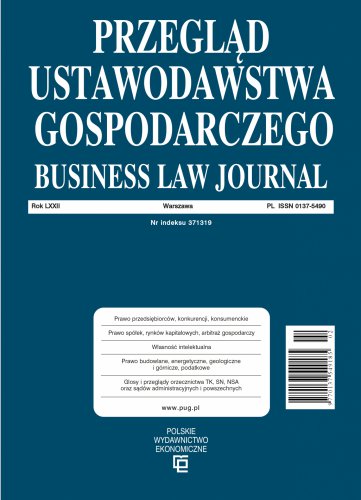Kryteria dopuszczalności decyzji zautomatyzowanych w świetle brzmienia art. 22 ust. 1 RODO
Celem niniejszego artykułu jest analiza postanowień Ogólnego rozporządzenia o ochronie danych (RODO) dotyczących dopuszczalności zautomatyzowanego podejmowania decyzji, zawartych w art. 22 ust. 1 RODO. Chociaż może się wydawać, że przepis ten jest jasny i jednoznaczny, dokładna analiza pokazuje, że przysparza on wiele trudności interpretacyjnych. W szczególności nie jest jasne, czy prawo do niepodlegania decyzji opartej wyłącznie na zautomatyzowanym przetwarzaniu powinno być interpretowane jako ogólny zakaz, czy też jako uprawnienie przysługujące osobie, której dane dotyczą, a także kiedy można uznać, że dana decyzja jest oparta wyłącznie na zautomatyzowanym przetwarzaniu danych. Przeprowadzona analiza pokazuje, że art. 22 ust. 1 RODO został sformułowany w sposób nieprecyzyjny, a w konsekwencji rodzi wątpliwości co do jego adekwatności do realizacji celów RODO oraz ochrony faktycznie zapewnianej osobom, których dane dotyczą.
Bibliografia
Bibliografia/References
Brkan, M. (2019). Do algorithms rule the world? Algorithmic decision-making and data protection in the framework of the GDPR and beyond. International Journal of Law and Information Technology, 27(2), 91–121. https://doi.org/10.1093/ijlit/eay017
Citron, D. K. (2008). Technological due process. Washington University Law Review, 85(6), 1249–1313.
Edwards, L., & Veale, M. (2018). Slave to the algorithm? Why a right to explanation is probably not the remedy you are looking for. Duke Law & Technology Review, 16(1), 18–81. https://doi.org/10.31228/osf.io/97upg
European Parliament. Directorate General for Parliamentary Research Services. (2019). Understanding algorithmic decision-making: Opportunities and challenges. Publications Office of the EU.
European Data Protection Board. (2018). Endorsement 1/2018. https://bit.ly/3DoFyBg.
European Data Protection Supervisor. (2021). Opinion 11/2021on the Proposal for a Directive on consumer credits. https://bit.ly/3JU6zyY.
Finck, M. (2019). Smart contracts as a form of solely automated processing under the GDPR. International Data Privacy Law, 9(2), 78–94. https://doi.org/10.1093/idpl/ipz004
Geburczyk, F. (2020). Prawa osób fizycznych w kontekście przetwarzania danych osobowych w procesach zautomatyzowanego podejmowania decyzji. Monitor Prawniczy, 581–587.
Grupa Robocza Art. 29. (2018). Wytyczne w sprawie zautomatyzowanego podejmowania decyzji w indywidualnych przypadkach i profilowania do celów rozporządzenia 2016/679/UE z 6 lutego 2018 r., 17/PL WP251rev. 01.
Hänold, S. (2018). Profiling and automated decision-making: Legal implications and shortcomings. W: M. Corrales, M. Fenwick, & N. Forgó (red.), Robotics, AI and the future of law (123–153). Springer Singapore. https://doi.org/10.1093/idpl/ipz004
Hoffmann-Riem, W. (2020). Artificial intelligence as a challenge for law and regulation. W: T. Wischmeyer & T. Rademacher (red.), Regulating artificial intelligence (1–29). Springer International Publishing. https://doi.org/10.1007/978-3-030-32361-5_1
Hustinx, P. (2017). EU data protection law: The review of Directive 95/46/EC and the General Data Protection Regulation. W: M. Cremona (red.), New technologies and EU law. Vol. 1. Oxford University Press. https://doi.org/10.1093/acprof:oso/9780198807216.003.0005
Kaminski, M. E. (2019a). Binary governance: Lessons from the GDPR's approach to algorithmic accountability. Southern California Law Review, 92(6), 1529–1616.
Kaminski, M. E. (2019b). The right to explanation, explained. Berkeley Technology Law Journal, 34(1), 189–219.
Litwiński, P. (2018). Komentarz do art. 22. W: Rozporządzenie UE w sprawie ochrony osób fizycznych w związku z przetwarzaniem danych osobowych i swobodnym przepływem takich danych. Komentarz. Legalis.
Maciejewski, M., & Sibiga, G. (2015). Automatyzacja w nakładaniu administracyjnych kar pieniężnych. W: M. Błachucki (red.), Administracyjne kary pieniężne w demokratycznym państwie prawa (72–82). Biuro Rzecznika Praw Obywatelskich.
Malgieri, G. (2019). Automated decision-making in the EU Member States: The right to explanation and other „suitable safeguards” in the national legislations. Computer Law & Security Review, 35(5). https://doi.org/10.1016/j.clsr.2019.05.002
Mendoza, I., & Bygrave, L. A. (2017). The right not to be subject to automated decisions based on profiling. W: T.-E. Synodinou, P. Jougleux, C. Markou, & T. Prastitou (red.), EU internet law (77–98). Springer International Publishing. https://doi.org/10.1007/978-3-319-64955-9_4
Moeller, C. (2017). Are we prepared for the 4th industrial revolution? Data protection and data security challenges of Industry 4.0 in the EU context. W: R. Leenes, R. van Brakel, S. Gutwirth & P. de Hert (red.), Data protection and privacy: The age of intelligent machines (143–164). Hart Publishing. https://doi.org/10.5040/9781509919376.ch-006
Sakowska-Baryła, M. (2018). Komentarz do art. 22. W: Ogólne rozporządzenie o ochronie danych osobowych. Komentarz. Legalis.
Sancho, D. (2020). Automated decision-making under Article 22 GDPR: Towards a more substantial regime for solely automated decisionmaking. W: M. Ebers & S. Navas (red.), Algorithms and law (136–156). Cambridge University Press. https://doi.org/10.1017/9781108347846.005
Selbst, A. D., & Powles, J. (2017). Meaningful information and the right to explanation. International Data Privacy Law, 7(4), 233–242. https://doi.org/10.1093/idpl/ipx022
Tosoni, L. (2021). The right to object to automated individual decisions: Resolving the ambiguity of Article 22(1) of the General Data Protection Regulation. International Data Privacy Law, 11(2), 145–162, https://doi.org/10.1093/idpl/ipaa024
Urząd Komisji Nadzoru Finansowego. (2020). Komunikat Urzędu Komisji Nadzoru Finansowego w sprawie realizacji przez banki i inne instytucje ustawowo upoważnione do udzielania kredytów prawa wnioskującego o kredyt do uzyskania wyjaśnień na temat dokonanej oceny zdolności kredytowej. https://www.knf.gov.pl/knf/pl/komponenty/img/Komunikat_UKNF_ws_prawa_do_uzyskania_wyjasnien_nt_oceny_zdolnosci_kredytowej_wersja_szczegolowa_70332.pdf
Veale, M. & Edwards, L., (2018). Clarity, surprises, and further questions in the Article 29 Working Party draft guidance on automated decision-making and profiling. Computer Law & Security Review, 34(2), 398–404. https://doi.org/10.1016/j.clsr.2017.12.002
Voigt, P., & von dem Bussche, A. (2017). The EU General Data Protection Regulation (GDPR). Springer International Publishing. https://doi.org/10.1007/978-3-319-57959-7
Wachter, S., Mittelstadt, B., & Floridi, L. (2017). Why a right to explanation of automated decision-making does not exist in the General Data Protection Regulation. International Data Privacy Law, 7(2), 76–99. https://doi.org/10.1093/idpl/ipx005
Yeung, K. (2019). Why worry about decision-making by machine? W: K. Yeung & M. Lodge (red.), Algorithmic regulation (21–48). Oxford University Press. https://doi.org/10.1093/oso/9780198838494.003.0002
Zalnieriute, M., Moses, L. B., & Williams, G. (2019). The rule of law and automation of government decision-making. The Modern Law Review, 82(3), 425–455. https://doi.org/10.1111/1468-2230.12412


 Nasza strona używa cookies między innymi w celu gromadzenia statystyk oraz prawidłowego funkcjonowania serwisu. Korzystanie z witryny bez zmiany ustawień Twojej przegladarki oznacza, że ciasteczka będa zapisywane na Twoim urządzeniu. Pamietaj, że zawsze możesz zmienić te ustawienia.
Nasza strona używa cookies między innymi w celu gromadzenia statystyk oraz prawidłowego funkcjonowania serwisu. Korzystanie z witryny bez zmiany ustawień Twojej przegladarki oznacza, że ciasteczka będa zapisywane na Twoim urządzeniu. Pamietaj, że zawsze możesz zmienić te ustawienia.